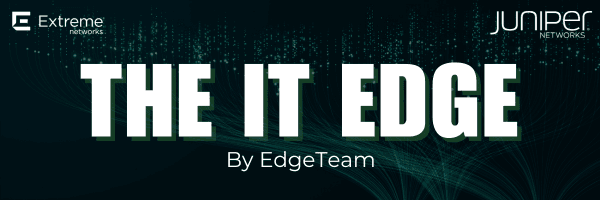
Like every holiday season, scammers are getting creative – and small businesses are their favorite target. At EdgeTeam, we see this firsthand with the small businesses we support. In today’s newsletter, we’re breaking down the latest tricks and showing you exactly how to spot them before they cause trouble.
Plus: The coolest tech updates you need to know about this week.
Let’s dive in!

The Anatomy of Holiday Scams
Cybercriminals are leveraging the holiday chaos to launch sophisticated scams that play on urgency, trust, and human error.
Fake Package Delivery Emails
These scams prey on the increase in online shopping and shipping activity during the holidays. Employees receive emails that look like legitimate shipping notifications from trusted carriers, but these messages often contain malicious links or attachments. Clicking on them can download malware or lead to phishing sites designed to steal credentials.
Phishing Disguised as Executive Requests
In these attacks, scammers impersonate high-ranking executives, like CEOs or department heads, to request sensitive information or urgent actions. For example, an employee might receive an email appearing to be from their manager, urgently asking for login details or for gift cards to be purchased for “client appreciation.”
SMS Phishing (Smishing)
Cybercriminals are extending their reach to mobile devices, sending text messages that appear to come from legitimate sources or trusted individuals. These texts often include urgent requests, like confirming a package delivery or providing account details, and they include malicious links.
As technology continues to advance, it’s important to stay informed about the trends shaping the future of IT.
Social Engineering Phishing – Growing Threat
Social engineering phishing is particularly dangerous because it doesn’t rely solely on technical vulnerabilities, it exploits human psychology. Scammers carefully craft their messages to appear authentic, often including personal or company-specific details to build trust.
A scammer might pose as the CEO and email an entry-level employee, referencing a recent meeting or event to seem credible. They might use phrases like, “This needs to be done before the end of the day,” creating a sense of urgency and discouraging the employee from questioning the request.
Once scammers gain access to sensitive information, they can use it to launch broader attacks, such as compromising email accounts, stealing financial data, or even conducting ransomware campaigns.

How to Protect Your Business?
1. Educate and Train Your Team
Employee awareness is your first line of defense against phishing attacks and scams. Even the most advanced security technologies can fail if employees inadvertently give attackers access.
- Regular Training Programs: Host periodic training sessions to teach employees how to recognize suspicious emails, links, or requests. Interactive platforms like KnowBe4 are excellent for delivering engaging and effective awareness programs tailored to various levels of technical expertise.
- Phishing Red Flags: Educate your team about key signs of phishing, such as generic greetings, urgent language, typos, or unexpected requests for sensitive information.
- Role-Specific Training: Tailor training programs to different roles. For example, finance teams may need specialized training on detecting invoice fraud, while customer service teams may need tips for identifying fake customer queries.
2. Test Your Defenses
Penetration testing (pen testing) is a proactive approach to uncover vulnerabilities in your security systems and employee awareness.
- Phishing Simulations: Simulate realistic phishing attacks to see how employees respond. This helps identify gaps in training and reinforce good security habits.
- Network Penetration Testing: Go beyond phishing and assess the strength of your network, identifying weaknesses in firewalls, servers, and endpoints.
- Third-Party Assessments: Consider hiring a cybersecurity firm to perform unbiased and comprehensive pen testing. This ensures all vulnerabilities—technical and human—are accounted for and addressed.
- Ongoing Assessments: Make pen testing a routine practice, especially during high-risk periods like the holidays, to keep your defenses sharp.
3. Strengthen Your Technology
While employee training is critical, advanced security tools are necessary to stay ahead of increasingly sophisticated threats.
- Real-Time Threat Detection: Invest in AI-driven solutions like Juniper’s AI-Native Edge, which uses machine learning to detect unusual activity, flag threats, and respond in real time. These tools can stop phishing attempts before they reach employees.
- Secure Access with ZTNA: Solutions like Extreme Networks’ ExtremeCloud Universal ZTNA implement a Zero Trust model, ensuring that only authorized users can access your systems, even when working remotely.
- 24/7 Monitoring: Consider comprehensive monitoring solutions like Arctic Wolf Security Monitoring, which provide round-the-clock surveillance, ensuring that any suspicious activity is caught and mitigated quickly.
By combining employee awareness, rigorous testing, and cutting-edge technology, your business can create a robust defense against cyber threats, ensuring a secure and productive holiday season.
Juniper Networks: Securing Your Business in Real-Time
Juniper’s AI-Native Edge brings cutting-edge protection with real-time threat detection, automated responses, and scalable security solutions. It’s the perfect way to keep your business safe without the need for a large, complex in-house IT team.
From stopping phishing emails to flagging malicious activity, Juniper Networks ensures your business stays secure so you can focus on growth.
What’s Trending in Tech
As technology continues to advance, it’s important to stay informed about the trends shaping the future of IT. Here are some key developments we’re seeing across the industry that could impact your business in the coming months:
- CISA’s 2025 Mandate: The U.S. Cybersecurity and Infrastructure Security Agency (CISA) has mandated federal agencies to secure their cloud environments through Binding Directive 25-01, with strict deadlines throughout 2025. The directive requires agencies to implement secure configuration baselines, starting with Microsoft 365 services, while also pushing for stronger end-to-end encryption practices in response to rising cyber threats.
- Russian Hackers Go Stealth: Russia’s APT29 group has launched sophisticated attacks using rogue RDP servers to target 200 high-profile victims in a single day. The hackers repurposed legitimate red teaming tools to intercept RDP connections and steal sensitive data, targeting governments, think tanks, and Ukrainian entities without deploying traditional malware.
- 914k Patient Privacy Compromised: ConnectOnCall, a medical answering service owned by Phreesia, has disclosed that hackers stole sensitive health information and personal data of nearly a million patients during a May breach. The incident, ranking as 2024’s 14th largest healthcare breach, compromised patient details including medical conditions, treatments, and some Social Security numbers.
Security Breaches Can Be Costly!
After experiencing a security breach, on of our customers sought to bolster its cybersecurity posture without the overhead of hiring a full in-house security team. They needed a scalable solution to provide continuous, expert threat monitoring and quick incident response.
We implemented Arctic Wolf’s 24/7/365 Security Monitoring, which leveraged cutting-edge detection technologies and a dedicated response team. The solution offered real-time threat intelligence, proactive vulnerability management, and immediate threat mitigation without the need for additional full-time staff.
With Arctic Wolf’s support, the company successfully mitigated future security threats, avoiding costly data breaches and downtime. This strategic implementation not only enhanced security but also delivered significant cost savings (could be hundreds of thousands of dollars over the long run) ensuring continuous protection of critical assets.
Stay Safe, and Happy Holidays!
EdgeTeam



Leave a Reply
Want to join the discussion?Feel free to contribute!